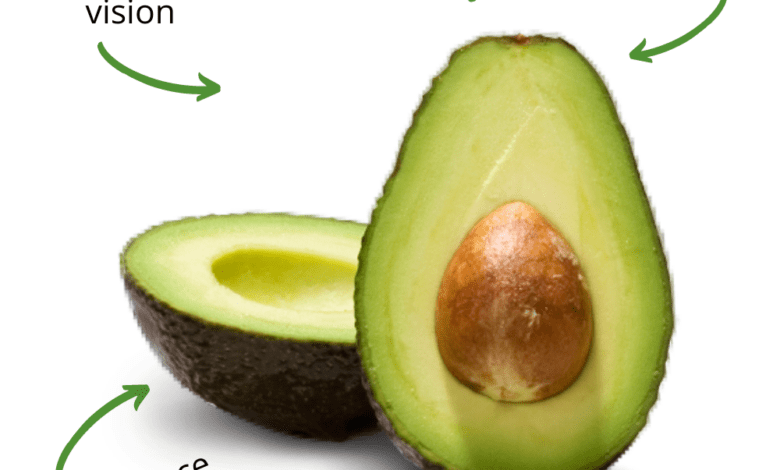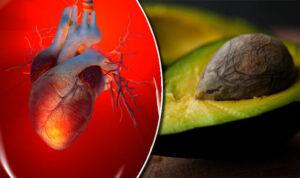
Heart Health and Avocados
Avocados have become an increasingly popular food in recent years, gracing toast, salads, and sandwiches across the globe. But the green fruit is more than just a tasty addition to meals – it also provides significant health benefits, especially for the heart.Information Guide Nigeria

Photo Source: Harvard Health Publishing
Avocados are packed with nutrients like healthy fats, fibre, vitamins and minerals that can help reduce risk factors for heart disease. Numerous studies have found connections between avocado consumption and better cholesterol levels, lower blood pressure, and decreased inflammation. With their potential to promote heart health, avocados have earned a place as a regular part of a heart-healthy diet.
👉 Relocate to Canada Today!
Live, Study and Work in Canada. No Payment is Required! Hurry Now click here to Apply >> Immigrate to CanadaHowever, avocados have a reputation for being high in fat and calories, which may seem at odds with heart health. The truth is, that the type of fat found in avocados is unsaturated fat, which is considered beneficial for heart health when consumed in moderation. Avocados are high in calories, but their richness and creaminess mean you can get away with using less. When incorporated sensibly into an overall healthy diet, avocados provide great nutritional value without unnecessary excess calories.Heart Health and Avocados
This article will explore the research behind avocados and heart health – looking at their nutritional benefits, ways they may support cardiovascular wellness, and how to enjoy them as part of heart-healthy eating. With the science-backed information below, you can understand why avocados deserve to be called a heart-healthy food.
The Nutritional Benefits of Avocados
Avocados stand out for their stellar nutritional profile, which contributes to many of their heart health perks. Here are some of the top nutrients and healthful components found in avocados:
1. Healthy Fats
Unlike most fruits, avocados are high in fat – but before you shun them, know that they contain a good kind of fat. Avocados provide mostly monounsaturated fat, the same heart-healthy kind found in olive oil and nuts.
Monounsaturated fat has been linked to reduced LDL or “bad” cholesterol and better heart health. In one study, eating an avocado a day as part of a moderate-fat diet was found to lower LDL cholesterol more than a similar diet without avocados.Top 15 Fintech Companies in Nigeria
Read Also: 15 Best High Fiber Foods You Should Eat
2. Fiber
Avocados are an excellent source of fibre, with about 4-5 grams per half fruit. Fibre promotes heart health by controlling cholesterol levels and supporting healthy digestion and elimination.
Studies show that increased dietary fibre intake is associated with up to a 22% reduction in risk of heart disease. The soluble fibre in avocados can also help regulate blood sugar levels, an important factor in diabetes risk.
👉 Relocate to Canada Today!
Live, Study and Work in Canada. No Payment is Required! Hurry Now click here to Apply >> Immigrate to Canada3. Potassium
Avocados provide more potassium than a banana, with about 345 mg per half fruit. Potassium acts as an electrolyte and is essential for muscle contractions including the heartbeat. It also helps regulate fluid balance in the body.
Diets rich in potassium have been linked to significantly lower rates of stroke, decreased blood pressure, and protection against loss of muscle mass.Top 15 Herbal Teas for Good Health in Nigeria
4. Vitamin E
This important antioxidant vitamin may provide cardiovascular benefits by preventing cholesterol oxidation and reducing inflammation. Avocados are a great source, with about 2 mg per half fruit.
Vitamin E may also fight blood clotting and prevent arrhythmias or irregular heart rhythms.
5. Vitamin C
Just half of an avocado delivers around 15% of your recommended daily vitamin C, an antioxidant that is vital for immune function and skin health.
Some research indicates that higher vitamin C intake is tied to a lower risk of heart disease. It may work by preventing the oxidation of cholesterol and protecting blood vessels from damage.
Read Also: Top 15 Foods to Help Boost Your Sex Life
6. Vitamin K
Best known for its role in blood clotting, vitamin K may also support bone and heart health. Avocados provide around 30% of the recommended daily amount of vitamin K per serving.Dollar to Naira
Studies link adequate vitamin K consumption with healthier blood pressure and reduced calcification of arteries – both important factors in preventing heart disease.
7. Lutein
Avocados are one of the best fruit sources of lutein, a carotenoid antioxidant important for eye health. Lutein accumulates in tissues including the eyes and heart tissue.
In the heart, it may help prevent atherosclerosis or blocked arteries by acting as an antioxidant and calming inflammation.
8. Beta-Sitosterol
Phytosterols like beta-sitosterol work to lower LDL cholesterol by preventing its absorption in the intestines. Avocados happen to be one of the richest dietary sources of beta-sitosterol.
Beta-sitosterol and other phytosterols are so effective that they have been added to cholesterol-lowering margarine spreads. Avocados provide these heart-healthy compounds naturally.
How Do Avocados Support Heart Health?
With their diverse array of vitamins, minerals, and other nutrients, avocados provide benefits for several aspects of cardiovascular wellness including:
1. Cholesterol Levels
Numerous studies have found that eating avocados can improve blood lipid profiles by decreasing LDL cholesterol and raising HDL or “good” cholesterol. A review of 10 studies found avocado consumption was associated with an average 13.5 mg/dL drop in total cholesterol.JAMB Result
Researchers believe the healthy monounsaturated fats, fibre, phytosterols and other compounds in avocados are responsible for these cholesterol-lowering effects.

Photo Source: Daily Express
2. Blood Pressure
Diets rich in fruits and vegetables are known to promote lower blood pressure. Avocados’ potassium and lutein content makes them especially beneficial – studies show people who eat foods high in these nutrients have reduced risk of hypertension.
3. Inflammation
Inflammation is at the root of many chronic diseases, including heart disease and stroke. The antioxidants in avocados like vitamin E, vitamin C, and lutein combat systemic inflammation to further support cardiovascular health.NYSC Portal
4. Insulin Response
The monounsaturated fats and fibre in avocados help stabilize blood sugar levels and may improve insulin sensitivity, decreasing diabetes risk. High blood sugar and insulin resistance are strongly linked with poor heart health.
5. Weight Management
Though high in calories and fat, studies show avocados may aid weight loss and weight maintenance when eaten in moderation. Their fibre and fat keep you satisfied, while their nutrients are involved in fat breakdown.
Maintaining a healthy body weight reduces risks for high cholesterol, hypertension, and diabetes.
Read Also: 15 Best Foods for Blood Sugar Regulation
Adding Avocados to a Heart-Healthy Diet
While avocados can be eaten on their own, they are extremely versatile and pair well with many different flavours and textures. Here are some tips for enjoying avocados as part of an overall heart-healthy way of eating:
- Use mashed avocado as a base for smoothies or as a thickener for dressings, sauces, soups or dips in place of cream, cheese, or oils.
- Top salads, grain bowls, tacos or sandwiches with sliced avocado for added nutrition.
- Mix cubes of avocado into cooked quinoa or brown rice with black beans, corn, and other veggies for a heart-healthy grain bowl.
- Spread avocado on whole-grain toast and top with salmon or an egg for a satisfying meal.
- Blend avocado with Greek yoghurt, herbs and a bit of lemon juice as a topping for grilled chicken or fish.
- For a healthy morning start, make an avocado smoothie with banana, berries, greens, and almond milk.
Potential Pitfalls of Avocado Consumption
Avocados offer proven benefits for cardiovascular wellness, but there are a few potential downsides to consider:
1. High in Calories
At around 240 calories and 24 grams of fat per avocado, they are one of the more calorie-dense fruits. Monitor your portions to keep calories under control.
2. Oxalates
Avocados contain oxalates, which may contribute to kidney stones in susceptible people. Those with a history of this condition should limit intake.
3. Not a Magical Cure-All
While avocados are extremely healthy, they should be enjoyed in moderation as part of an overall nutritious diet. No one food is a cure-all for heart disease.
4. Environmental Impact
The rising popularity of avocados has raised environmental concerns in places like Mexico, where avocado farming is linked to illegal deforestation. Try buying locally if possible.
5. Quick Spoiling
Avocados become overripe rapidly after cutting. Plan to use opened avocados within a day or two for maximum freshness and nutrients.
Read Also: Top 15 Foods for Cancer Prevention
Recipe Inspiration: Avocado Toast 4 Ways
This avocado toast recipe is endlessly adaptable, letting you switch up flavors based on what you have on hand. Try these fun variations:
1. Basic
- Toast whole grain bread
- Spread with mashed avocado
- Sprinkle with sea salt and pepper
2. Smoky Southwest
- Toast bread
- Rub with cut garlic clove
- Spread with avocado and black beans
- Top with smoked paprika, cilantro and lime juice
3. Eggs and Everything
- Toast bread
- Spread with avocado
- Top with sliced hard-boiled egg, sesame seeds, and red pepper flakes
4. Lox and Cream Cheese
- Toast bread
- Spread with cream cheese and top with smoked salmon
- Spread avocado on salmon
- Finish with capers, dill, and lemon zest
The many vitamins, minerals, antioxidants and other beneficial plant compounds in avocados can provide protection for the cardiovascular system. But it’s important to enjoy avocados and other high-fat plant foods as part of an overall diet focused on produce, lean proteins, whole grains, legumes, nuts and healthy oils like olive oil.
When combined with regular exercise and avoidance of smoking, a balanced diet that includes avocados is a great recipe for lifelong heart health.
Heart Health Research and Avocados
Numerous studies over recent years have uncovered connections between avocado consumption and better heart health markers. Here is a review of some of the most promising and interesting research:
1. Decreased LDL Cholesterol
One 2019 review compiled the results of 12 different clinical trials examining the effects of avocado intake on cholesterol levels. Across the studies, avocado consumption was linked to decreases in total cholesterol, LDL cholesterol, and triglycerides.
Researchers concluded that partially replacing animal-based fats with avocado could benefit heart health by improving blood lipid profiles.Good Morning my love Messages
2. Lowered Blood Pressure
A study on 45 overweight adults found that including avocados in their diet for just 3 weeks resulted in significant reductions in both systolic and diastolic blood pressure compared to participants who did not eat avocados.
Researchers attributed this result to avocados’ fat, fibre and potassium content. High blood pressure is a major risk factor for heart disease.
3. Reduced Arterial Stiffness
Stiffening of the arteries is associated with cardiovascular events like heart attack and stroke. A 2020 study looked at the effects of avocado consumption on markers of arterial stiffness in people with overweight or obesity.
Eating one avocado per day for 6 months was found to significantly reduce arterial stiffness compared to those who did not eat avocados, indicating a potentially decreased risk of vascular issues.
Read Also: 15 Best Food for Dinner in Nigeria
4. Protection Against Cholesterol Oxidation
Cholesterol oxidation is a risk factor for atherosclerosis. A study had participants eat an avocado a day for 14 days and then measured oxidized cholesterol levels before and after.Romantic Love Messages for her
Avocado consumption reduced total and LDL cholesterol oxidation by 20%, which researchers said may be due to antioxidants like lutein and vitamin E that protect against cholesterol oxidation.
5. Improved Endothelial Function
Endothelial dysfunction, or damage to the lining of the blood vessels, underlies the development of coronary artery disease. A study looked at whether avocado oil could improve endothelial function.
Participants who incorporated avocado oil into their diet for 4 weeks were found to have improved blood flow and function of the endothelium. This indicates better vascular health.
6. Lower Risk of Metabolic Syndrome
Metabolic syndrome refers to a cluster of conditions like hypertension, high blood sugar, and abdominal obesity that increase heart disease risk.
A large-scale study using data from over 17,000 participants found that those who regularly ate avocados had a 50% lower risk of metabolic syndrome compared to non-consumers.
While more research is still needed, this data shows avocados’ potential to protect against multiple cardiovascular risk factors at once.
7. Decreased Inflammation
Inflammation is not only a predictor of heart disease, but likely an underlying cause. A small study found beneficial anti-inflammatory effects from avocado consumption.
Participants ate 80 grams of avocados daily for 5 weeks. The avocado diet reduced blood levels of inflammatory cytokines IL-6 and TNF-alpha that contribute to atherosclerosis development.
8. Better Quality Diet
Beyond their own nutritional benefits, some research shows that eating avocados may increase overall diet quality. A study tracked the diets of people who ate avocados versus those who did not.
Avocado consumers had a significantly higher intake of fruits, vegetables, fibre, vitamins and minerals. This indicates avocados may promote healthier eating patterns.
The Bottom Line
Research increasingly supports what avocado fans have known all along – these green nutritional powerhouses are really good for you, especially your heart. The unique blend of healthy fats, fibre, vitamins, minerals and antioxidants in avocados appears to provide protection against numerous risk factors for heart disease and stroke.
While no one food is a magic bullet for cardiovascular health, incorporating avocados into a balanced diet on a regular basis may go a long way towards supporting lifelong heart wellness.
When paired with other heart-healthy lifestyle factors like regular exercise, not smoking, and maintaining a healthy body weight, a diet that includes avocados becomes a recipe for keeping your heart in peak condition. Science shows that regularly eating avocados is an easy and delicious way to do your heart a favour.JAMB Portal
Read Also: Top 15 Foods for Skin and Hair Benefits
FAQs
Q: Are avocados good for your heart?
A: Yes, avocados provide significant cardiovascular benefits. They are packed with heart-healthy nutrients and compounds that help lower cholesterol, blood pressure, and inflammation – all major promoters of heart disease.
Q: Do avocados lower cholesterol?
A: Many studies have found that eating avocados can decrease LDL or “bad” cholesterol. This effect is likely due to avocados’ monounsaturated fats, fibre, vitamin E and phytosterols that improve cholesterol profiles.
Q: How do avocados help your heart?
A: Avocados help the heart in many ways. Their healthy fats, fibre, antioxidants, minerals and other nutrients can lower cholesterol, blood pressure and inflammation. They also may improve blood flow, and insulin response, and protect arteries from damage.
Q: Are avocados high in fat?
A: Yes, avocados are high in fat – but it is mainly monounsaturated fat, which is considered a “healthy” type of fat. When eaten in moderation as part of a balanced diet, the fat in avocados provides health benefits.
Q: Do avocados cause high cholesterol?
A: No, avocados do not cause high cholesterol. In fact, research shows avocado consumption lowers cholesterol levels. The unsaturated fats, fibre and other compounds in avocados improve cholesterol profiles.
Q: How often should you eat avocados for heart health?
A: Many studies showing heart health benefits had participants eating around 1 avocado per day. Consuming just 1-2 servings of avocado per week may offer advantages for cardiovascular wellness over not eating them at all.
Q: Are avocados good for high blood pressure?
A: Yes, eating avocados may help lower blood pressure due to their high amounts of potassium, lutein and monounsaturated fats. Replacing other fats with avocado can also improve blood pressure.
Q: Do avocados help with weight loss?
A: Avocados can aid weight loss when eaten in moderation as part of a healthy diet. Despite being high in fat and calories, their fibre and nutrients help regulate appetite and metabolism. Losing excess weight promotes heart health.
Read Also: Top 15 Aphrodisiac Foods for Women
Q: Are avocados bad for your heart?
A: No, avocados are not bad for your heart – research overwhelmingly shows they are beneficial for heart health when incorporated into a balanced diet. However, those with certain conditions like kidney stones may need to limit intake.
Check JAMB Result
Check and Confirm: How much is Dollar to Naira








